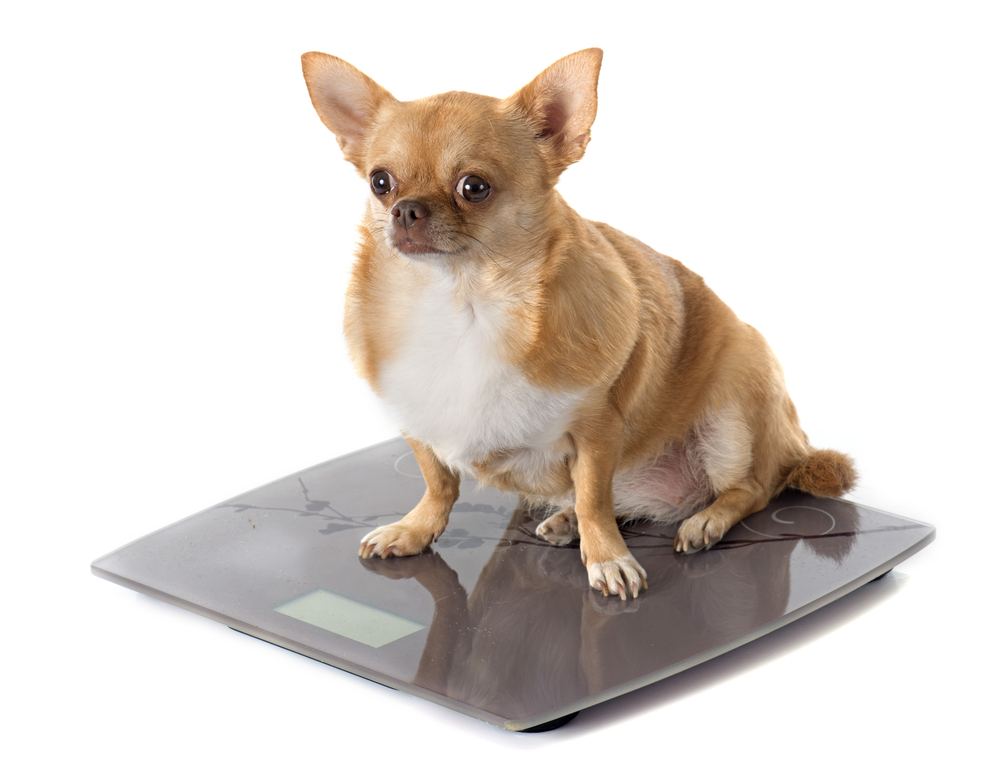How to Treat and Prevent Pet Obesity

Causes of Obesity
There are a few different possible causes for obesity. Unfortunately, the first is that we as pet owners tend to overfeed our pets. Humans often associate food with love, which means we show our pets love by giving them extra food, treats, and even human food.
Pets need exercise, just like we humans do. As our lives get busier and busier, we tend to spend less time helping our pets get the physical activity they need. A romp through the backyard from time-to-time isn’t enough. Our pets need us to be interactive with them. Games of fetch, swimming, running, walking, and other activities are the best way to ensure that our dogs are getting enough exercise each day. Keep in mind, however, that just like an overweight person, we can’t expect our pets to go from a mostly sedentary lifestyle to running 5 miles a day overnight (especially when it’s hot!). A gradual increase in activity, under the guidance of a veterinarian or veterinary rehabilitation and fitness expert, is the best way to keep your pet from harm and injury as you begin their fitness regimen.
For cats, exercise needs are even harder to meet. Cats are at their safest when they are kept indoors, but indoor cats don’t have access to as much physical activity. Using food puzzles or toys can be a great way to get your cat moving because they activate the prey instinct of the cat. You can also get toys that require your pet to jump and chase them around.
Health Concerns for Obese Pets
Obesity is a health problem of its own, but it also causes other health problems. One common health issue associated with obesity is accelerated accumulation of arthritis. Diabetes is another condition that is largely correlated with obesity, and this condition is much more challenging to manage than obesity alone. Cystitis, chronic renal disease, and congestive heart failure have all been tied to obesity in both cats and dogs as well.
Additionally, obesity tends to decrease the lifespan of our pets. Dogs and cats in a healthy weight range tend to live six to twelve months longer than animals who are overweight or obese. In fact, some studies have even shown that being moderately overweight can decrease life expectancy by two years for dogs.
Treating Pet Obesity
Fortunately for pet owners, most pets can achieve a normal weight with consistency and time. Losing weight requires changes to your pet’s diet and exercise routine. Obese dogs and cats will need to be put on special diets. During this time, the overweight cats and dogs will not be allowed to have any people food or treats that are not approved by your veterinarian or veterinary nutritionist. Your veterinarian can recommend pet food that will give your pet all the nutrients it needs while promoting weight loss. Crash diets are not recommended for pets, and can be extremely dangerous, and even fatal in some cases. Never start a diet for your pet without consulting your veterinarian.
Depending on how much extra weight your pet is carrying, you may be able to set up an exercise routine with your veterinarian or, in some cases, you might consider a physical rehabilitation specialist. At GCVS, our rehabilitation team can help your pet lose weight with low-impact exercises like water treadmills, in a controlled, air-conditioned environment to prevent overheating. When pets are in danger doing normal exercise, rehabilitation is the best way to increase activity without risking potential health problems. Ask your veterinarian if they believe that physical rehabilitation can help your pet.
Preventing Pet Obesity
Prevention is the best tactic when it comes to dealing with obesity in pets. Your pet’s weight should be a priority of their health, because overweight pets are more likely to battle a multitude of other conditions. The best ways to prevent obesity is to make sure your pet is getting enough exercise and that you are feeding them an appropriate diet, without too many treats!
When you bring a pet home for the first time, take them to see your veterinarian to discuss their diet and exercise needs to make sure you are doing your best to prevent future problems with obesity. Also, your veterinarian will take notes of your pet’s weight at each appointment you have. If they notice that your pet is gaining weight, they should discuss it with you. If your pet is overweight, it is important to take action now.
If your pet is struggling with obesity and you need help, ask your veterinarian for a referral to GCVS. GCVS can be reached by phone at 713-693-1111, or via email at info@gcvs.com.
